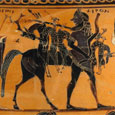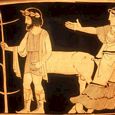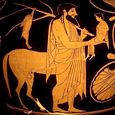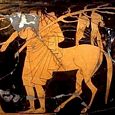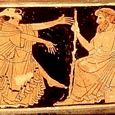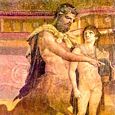KHEIRON
Greek Name
Χειρων
Transliteration
Kheirôn
Latin Spelling
Chiron
Translation
Skilled with Hands
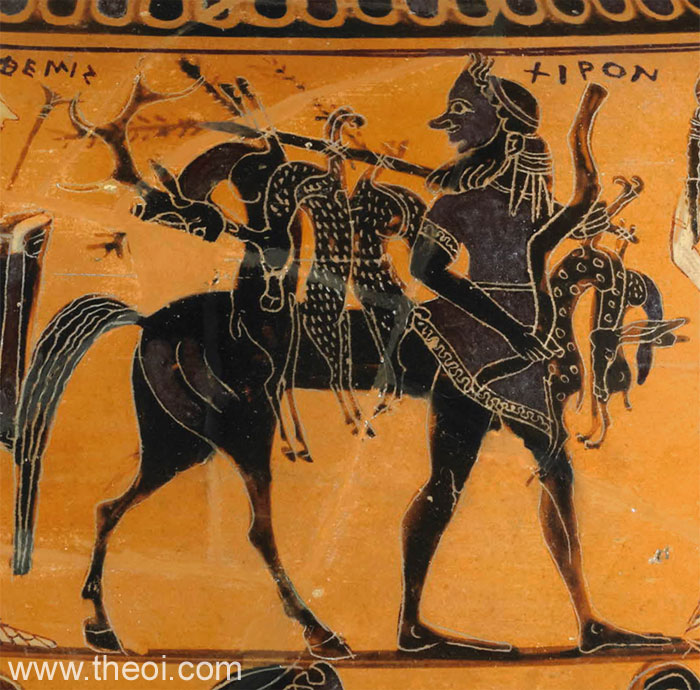
KHEIRON (Chiron) was eldest and wisest of the Kentauroi (Centaurs), a Thessalian tribe of half-horse men. Unlike his brethren Kheiron was an immortal son of the Titan Kronos (Cronus) and a half-brother of Zeus. When Kronos' tryst with the nymphe Philyra was interrupted by Rhea, he transformed himself into a horse to escape notice and the result was this two-formed son.
The rest of the Kentauroi (Centaurs) were spawned by the cloud Nephele on the slopes of Mount Pelion in Magnesia where they were nursed by the daughters of Kheiron.
Kheiron was a renowned teacher who mentored many of the greatest heroes of myth including the Argonauts Jason and Peleus, the physician Asklepios (Asclepius), the demi-god Aristaios (Aristaeus) and Akhilleus (Achilles) of Troy.
The old Kentauros was accidentally wounded by Herakles when the hero was battling other members of the tribe. The wound, poisoned with Hydra-venom, was incurable, and suffering unbearable pain Kheiron voluntarily relinquished his immortality. Zeus then placed him amongst the stars as the constellation Sagittarius or Centaurus.
In ancient Greek vase painting Kheiron was often depicted with a form quite distinct from that of the other Kentauroi--he had the full body of a man, from head to foot, with a partial horse-body attached to his rump, and was clothed in a full-length chiton and boots. This unusual form might simply reflect his appearance in Greek drama where costume-limitations required a simplication of the centaurine-form. The other Kentauroi, who do not appear in Athenian drama, were depicted unclothed and with fully equine forms below the waist.
Kheiron's name was derived from the Greek word for hand (kheir) and meant something like "skilled with the hands." In myth it was also closely associated with the word kheirourgos "surgeon."
FAMILY OF CHIRON
PARENTS
[1.1] KRONOS & PHILYRA (Titanomachia Frag 6, Pindar Pythian Ode 3, Apollodorus 1.8, Apollonius Rhodius 2.1231, Hyginus Faulaeb 138, Hyginus Astronomica 2.38, Ovid Metamorphoses 6.126 & 7.352, Ovid Fasti 5.379, Virgil Georgics 3.92 & 3.549, Pliny Natural History 7.197)
OFFSPRING
[1.1] THE NYMPHAI PELIONIDES (by Khariklo) (Pindar Pythian Ode
5)
[2.1] ENDEIS (Hyginus Fabulae 14)
[3.1] MELANIPPE (Euripides Melanippe
Frag, Callimachus Frag, Hyginus Astronomica 2.18)
[3.2] OKYRRHOE (by Khariklo) (Ovid Metamorphoses
2.635)
[4.1] KARYSTOS (by Khariklo) (Scholiast on Pindar's Pythian
4.181, Eustathius on Homer 281)
ENCYCLOPEDIA
CHEIRON (Cheirôn), the wisest and justest of all the centaurs. (Hom. Il. xi. 831.) He was the instructor of Achilles, whose father Peleus was a friend and relative of Cheiron, and received at his wedding with Thetis the heavy lance which was subsequently used by Achilles. (Il. xvi. 143, xix. 390.) According to Apollodorus (i. 2. § 4), Cheiron was the son of Cronus and Philyra. He lived on mount Pelion, from which he, like the other centaurs, was expelled by the Lapithae; but sacrifices were offered to him there by the Magnesians until a very late period, and the family of the Cheironidae in that neighbourhood, who were distinguished for their knowledge of medicine, were regarded as his descendants. (Plut. Sympos. iii. 1 ; Müller, Orchom. p. 249.) Cheiron himself had been instructed by Apollo and Artemis, and was renowned for his skill in hunting, medicine, music, gymnastics, and the art of prophecy. (Xen. Cyneg. 1; Philostr. Her. 9, Icon. ii. 2; Pind. Pyth. ix. 65.) All the most distinguished heroes of Grecian story are, like Achilles, described as the pupils of Cheiron in these arts. His friendship with Peleus, who was his grandson, is particularly celebrated. Cheiron saved him from the hands of the other centaurs, who were on the point of killing him, and he also restored to him the sword which Acastus had concealed. (Apollod. iii. 13. § 3, &c.) Cheiron further informed him in what manner he might gain possession of Thetis, who was doomed to marry a mortal. He is also connected with the story of the Argonauts, whom he received kindly when they came to his residence on their voyage, for many of the heroes were his friends and pupils. (Apollon. Rhod. i. 554; Orph. Argon. 375, &c.) Heracles too was connected with him by friendship ; but one of the poisoned arrows of this hero was nevertheless the cause of his death, for during his struggle with the Erymanthian boar, Heracles became involved in a fight with the centaurs, who fled to Cheiron, in the neighbourhood of Malea. Heracles shot at then, and one of his arrows struck Cheiron, who, although immortal, would not live any longer, and gave his immortality to Prometheus. According to others, Cheiron, in looking at one of the arrows, dropped it on his foot, and wounded himself. (Ovid. Fast. v. 397; Hygin. Poet. Astr. ii. 38.) Zeus placed Cheiron among the stars. He had been married to Nais or Chariclo, and his daughter Endeis was the mother of Peleus. (Apollod. iii. 12. § 6.) Cheiron is the noblest specimen of a combination of the human and animal forms in the ancient works of art; for while the centaurs generally express the sensual and savage features of a man combined with the strength and swiftness of a horse, Cheiron, who possesses the latter likewise, combines with it a mild wisdom. He was represented on the Amyclaean throne of Apollo, and on the chest of Cypselus. (Paus. iii. 18. § 7, v. 19. § 2.) Some representations of him are still extant, in which young Achilles or Erotes are riding on his back. (Mus. Pio-Clement. i. 52.)
Source: Dictionary of Greek and Roman Biography and Mythology.
CLASSICAL LITERATURE QUOTES
PARENTAGE & BIRTH OF CHIRON
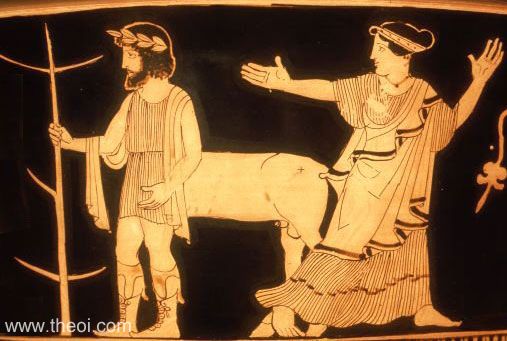
Eumelus of Corinth or Arctinus of Miletus, Titanomachia Frag 6 (from Scholiast on
Apollonius Rhodius 1. 554) (trans. Evelyn-White) (Greek epic C7th or C6th B.C.) :
"The author of the War of the Giants (Gigantomakhia) says that Kronos (Cronus) took the
shape of a horse and lay with Philyra, the daughter of Okeanos (Oceanus). Through this cause Kheiron (Chiron)
was born a Kentauros (Centaur): his wife was Khariklo (Chariclo)."
Pseudo-Apollodorus, Bibliotheca 1. 8 - 9 (trans. Aldrich) (Greek mythographer C2nd
A.D.) :
"The Titanes (Titans) had children . . . Kheiron (Chiron), a double-formed Kentauros (Centaur), was born to
Kronos (Cronus) and Philyra."
Apollonius Rhodius, Argonautica 2. 1231 ff (trans. Rieu) (Greek epic C3rd B.C.)
:
"By nightfall they [the Argonauts] were passing the Isle of Philyra [at the eastern end of the Black Sea].
This was where Kronos (Cronus) son of Ouranos (Uranus), deceiving his consort Rhea, lay with Philyra daughter of
Okeanos (Oceanus) in the days when he ruled the Titanes (Titans) in Olympos and Zeus was still a child, tended
in the Kretan (Cretan) cave by the Kouretes (Curetes) of Ida. But Kronos and Philyra were surprised in the very
act by the goddess Rhea. Whereupon Kronos leapt out of bed and galloped off in the form of a long-maned
stallion, while Philyra in her shame left the place, deserting her old haunts, and came to the long Pelasgian
ridges. There she gave birth to the monstrous Kheiron (Chiron), half horse and half divine, the offspring of a
lover in questionable shape."
Callimachus, Hymn 4 to Delos 104 ff (trans. Mair) (Greek poet C3rd B.C.) :
"The cliffs of Kheiron (Chiron) [on Mount Pelion] . . . O Pelion, bridal chamber of Philyra."
Pseudo-Hyginus, Fabulae 138 (trans. Grant) (Roman mythographer C2nd A.D.)
:
"When Saturnus [Kronos (Cronus)] was hunting Jove [Zeus] throughout the earth, assuming the form of a steed
he lay with Philyra, daughter of Oceanus. By him she bore Chiron the Centaur, who is said to have been the first
to invent the art of healing. After Philyra saw that she had borne a strange species, she asked Jove [Zeus] to
changed her into another form, and she was transformed into the tree which is called the linden."
Ovid, Metamorphoses 6. 126 ff (trans. Melville) (Roman epic C1st B.C. to C1st A.D.)
:
"Saturnus [Kronos (Cronus)], as a horse begot the centaur Chiron."
Ovid, Metamorphoses 7. 352 ff :
"The peak of shady Pelion, the home of [Kheiron (Chiron)] the old son of Philyreia (Philyra)."
Pliny the Elder, Natural History 7. 197 (trans. Rackham) (Roman encyclopedia C1st
A.D.) :
"Chiron the son of Saturnus [Kronos (Cronus)] and Philyra."
Nonnus, Dionysiaca 48. 77 ff (trans. Rouse) (Greek epic C5th A.D.) :
"Pelion . . . [and] the cave of Philyre."
CHIRON INVENTOR OF MEDICINE & SURGERY
Homer, Iliad 11. 832 ff (trans. Lattimore) (Greek epic C8th B.C.) :
"[Eurypylos addresses Patroklos (Patroclus) in the Trojan War :] ‘Cut the arrow out of my thigh . . .
and put kind medicines on it, good ones, which they say you have been told of by Akhilleus (Achilles), since
Kheiron (Chiron), most righteous of the Kentauroi (Centaurs), told him about them.’"
Pseudo-Apollodorus, Bibliotheca 3. 175 (trans. Aldrich) (Greek mythographer C2nd
A.D.) :
"Phoinix (Phoenix) had been blinded by his father . . . Peleus led Phoinix to Kheiron (Chiron), who healed
his eyes."
Aelian, On Animals 2. 18 (trans. Scholfield) (Greek natural history C2nd A.D.)
:
"In Homer skill in treating the wounded and persons in need of medicine goes back as far as the third
generation of pupil and master [see Iliad 11. 832 above]. Thus Patroklos (Patroclus), son of Menoitios
(Menoetius), is taught the healing art by Akhilleus (Achilles), and Akhilleus, son of Peleus, is taught by
Kheiron (Chiron), son of Kronos (Cronus). And heroes and children of the gods learnt about the nature of roots,
the use of different herbs, the concocting of drugs, spells to reduce inflammations, the way to staunch blood,
and everything else that they knew."
Ptolemy Hephaestion, New History Book 1 (summary from Photius, Myriobiblon 190)
(trans. Pearse) (Greek mythographer C1st to C2nd A.D.) :
"Kokytos (Cocytus) was the name of a pupil to whom Kheiron (Chiron) had taught medicine and who cared for
Adonis when he was wounded by the wild boar."
Pseudo-Hyginus, Fabulae 274 (trans. Grant) (Roman mythographer C2nd A.D.)
:
"Inventors and their inventions . . . Chiron, son of Saturnus [Kronos (Cronus)], first used herbs in the
medical art of surgery."
Virgil, Georgics 3. 549 ff (trans. Fairclough) (Roman bucolic C1st B.C.) :
"[A great dearth is followed by hunger and disease :] On this land from the sickened sky there once came a
piteous season that glowed with autumn's full heat . . . masters in the art [of medicine] fail, Chiron
Phyllyrides (son of Phillyra), and Melampus, Amythaon's son."
Propertius, Elegies 2. 1 (trans. Goold) (Roman elegy C1st B.C.) :
"Medicine can cure all human pains . . . Chiron, son of Phillyra, healed the blindness of Phoenix."
Pliny the Elder, Natural History 7. 197 (trans. Rackham) (Roman encyclopedia C1st
A.D.) :
"[On inventions :] The science of herbs and drugs was discovered by Chiron the son of Saturnus [Kronos
(Cronus)] and Philyra."
Statius, Silvae 1. 4. 98 (trans. Mozley) (Roman poetry C1st A.D.) :
"If there be any herb [to cure this illness] in twy-formed Chiron's health-giving cave."
Nonnus, Dionysiaca 35. 60 ff (trans. Rouse) (Greek epic C5th A.D.) :
"What ridge of the paturing woodlands must I traverse to summon old lifebringing Kheiron (Chiron) to help
your wound? Or where can I find medicines, the secrets of Paieon the Healer's [Asklepios' (Asclepius')]
painassuaging art? Would that I had what they call the herb Kentaurida (Of the Centaur), that I might bind the
flower of no-pain upon your limbs, and bring you back safe and living from Haides whence none returns! What
magic hymn have I, or song from the stars, that I may chant the ditty with Euian voice divine, and stay the flow
of blood from your wounded side? Would I had here beside me the fountain of life, that I might pour on your
limbs that painstilling water and assuage your adorable wound, to bring back even your soul to you again!"
See also Chiron Mentor of Asclepius (below)
CHIRON MENTOR OF ASCLEPIUS
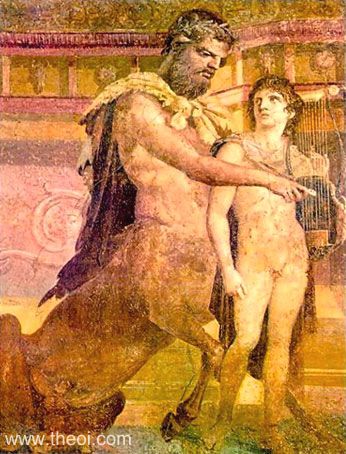
Homer, Iliad 4. 215 ff (trans. Lattimore) (Greek epic C8th B.C.) :
"In skill he [Makhaon (Machaon)] laid healing medicines on it [the hero's wound] that Kheiron (Chiron) in
friendship long ago had given his father [Asklepios (Asclepius)]."
Pindar, Pythian Ode 3. 1 ff (trans. Conway) (Greek lyric C5th B.C.) :
"Would that Kheiron (Chiron), the son of Philyre (Philyra)--if so be that my lips the prayer must utter
that lives in every heart--would that he might regain the life he left long since, that man of widespread power,
the son of Kronos (Cronus) son of Ouranos (Uranus), and that wild creature of the woods, that lover of mankind,
were lord of Pelion's valleys still; such as he was when long ago he nursed gentle Asklepios (Asclepius), that
craftsman of new health for weary limbs and banisher of pain, the godlike healer of mortal sickness."
Pindar, Pythian Ode 3. 43 ff :
"In one stride [Apollon] was there, and seized the babe [Asklepios (Aclepius)] from the dead maid [Koronis
(Coronis)]; and round him the blazing flames opened a pathway.
Then he took the child to the Magnetian Kentauros (Magnesian Centaur) [i.e. Kheiron (Chiron)], that he teach him
to be a healer for mankind of all their maladies and ills."
Pindar, Pythian Ode 3. 61 ff :
"Now if Kheiron (Chiron) the wise dwelt still within his cave, and if some spell to charm his soul lay in
the honeyed sweetness of my songs, then might I surely persuade him for men of noble mind to grant them a
physician of feverish ills, some son of Apollon, or even the son of Zeus himself."
Pindar, Nemean Ode 3. 52 ff :
"Wise-hearted Kheiron (Chiron) . . . to Asklepios (Asclepius) taught the soft-fingered skills of medicine's
lore."
Pseudo-Apollodorus, Bibliotheca 3. 118 - 122 (trans. Aldrich) (Greek mythographer
C2nd A.D.) :
"As she [Koronis (Coronis)] was being consumed on her funeral pyre, he [Apollon] snatched her baby
[Asklepios, Asclepius] from the fire and took him to the Kentauros Kheiron (Centaur Chiron), who reared him and
taught him medicine and hunting."
Pseudo-Hyginus, Astronomica 2. 38 (trans. Grant) (Roman mythographer C2nd A.D.)
:
"Chiron, son of Saturnus [Kronos (Cronus)] and Philyra, who surpassed not only the other Centauri
(Centaurs), but also men in justice, and is thought to have reared Aesculapius (Asclepius) and Achilles."
Ovid, Metamorphoses 2. 628 ff (trans. Melville) (Roman epic C1st B.C. to C1st A.D.)
:
"Phoebus [Apollon] . . . snatched his son [Asklepios (Asclepius)] out of his mother's womb [as she lay dead
on her funeral pyre], out of the flames and carried him to two-formed Chiron's cave . . . The centaur was
delighted with that child of heavenly stock, his honourable charge. One day the Centaurus' [Chiron's] daughter
came . . . Ocyroe (Swift-Flowing) . . . In the mystic mood of prophecy, when hidden in her heart the heavenly
fervour glowed, she fixed her eyes upon the child [Asklepios] [and foretold his future]."
CHIRON MENTOR OF ARISTAEUS & ACTAEON
Pindar, Pythian Ode 9. 26 ff (trans. Conway) (Greek lyric C5th B.C.) :
"Once as she [Kyrene (Cyrene) mother of Aristaios (Aristaeus)] battled with a fearsome lion, alone, without
a spear, Apollon, far-shooting god of the broad quiver, came upon her; and straightway called from out his
dwelling Kheiron (Chiron) and thus addressed him : ‘Son of Philyre, come from your holy cave, and marvel
at a woman's spirit and mighty vigour; with what undaunted mind she wages battle, a young maid with a heart that
rides o'er every labour, and a spirit never shaken by the cold storms of fear. What mortal father begot this
maid? And from what race of men has she been reft, to dwell within the dark dells of these clouded mountains?
For her soul breeds a boundless wealth of valour. It is right to lay on her the touch of an ennobling hand, or
even to pluck the flower of love, sweeter than honey?’
Then spoke the inspired Kentauros (Centaur), gentle laughter gleaming beneath his kindly brows and of his wisdom
made straightway this answer : ‘Secret, great Phoibos (Phoebus) [Apollon], are the keys of wise Persuasion
(Peitho) to love's true sanctities; both gods and men alike, in reverent modesty, are loth to taste in the open
light of day the first sweet fruits of love. Yet thou, for whom even to savour falsehood is sacrilege, art led
by they desire's delight thus to dissemble. Dost thou ask, o king, of what race is the maiden? Thou who knowest
well the fated end of all things, whither all roads shall lead, who know'st the number of leaves that earth puts
forth to meet the spring, how many grains of sand the surge of sea, or the sweeping gales send rolling down
beside the river banks; thou who see'st clearly what shall be, and whence it shall betide! Yet if I needs must
rival my wisdom against thine, thus shall I speak: to this glade didst thou come to be a husband to this maid,
with the intent to carry her far o'er the sea, to a choice garden of great Zeus . . .’
So Kheiron spoke and decreed for the god his bridal's dear fulfilment."
Pseudo-Apollodorus, Bibliotheca 3. 30 (trans. Aldrich) (Greek mythographer C2nd A.D.)
:
"To Autonoe and Aristaios (Aristaeus) was born a son Aktaion (Actaeon), who was reared by Kheiron (Chiron)
and trained as a huntman, but was later eaten up on Kithairon (Cithaeron) by this own dogs . . . They say that
the goddess [Artemis] changed him [Aktaion] into a deer, and drove his fifty hunting dogs into a frenzy so that
they unintentionally ate him. When he was no more, they looked for their master with great howls and bays,
coming in the course of their search to Kheiron's cave. He made a likeness of Aktaion, which assuaged their
grief."
Apollonius Rhodius, Argonautica 2. 512 ff (trans. Rieu) (Greek epic C3rd B.C.)
:
"Kyrene (Cyrene) herself was left in Libya by Apollon, who in token of his love made her a Nymphe and
huntress with the gift of a long life. But he took his infant son [Aristaios (Aristaeus), his son by Kyrene]
away to be brought up by Kheiron (Chiron) in his cave. When the child had grown up the divine Mousai (Muses)
found him a bride, taught him the arts of healing and prophecy, and made him the shepherd of all their flocks
that grazed on the Athamantian plain in Phthia, round Mount Othrys and in the valley of the sacred River
Apidanos. There came a time, however, when Aristaios migrated."
CHIRON MENTOR OF JASON
Hesiod, Theogony 993 ff (trans. Evelyn-White) (Greek epic C8th or C7th B.C.)
:
"[Medeia] bare a son Medeus [to Iason (Jason)] whom Kheiron (Chiron) the son of Philyra brought up in the
mountains."
Hesiod, Catalogues of Women Fragment 13 :
"Iason (Jason), shepherd of the people, whom Kheiron (Chiron) brought up in woody Pelion."
Pindar, Nemean Ode 3. 52 ff (trans. Conway) (Greek lyric C5th B.C.) :
"This tale too of men of old have I. Wise-hearted Kheiron (Chiron) nursed the great Iason (Jason) under his
roof."
Pindar, Pythian Ode 4. 101 ff (trans. Conway) (Greek lyric C5th B.C.) :
"With a bold heart and gentle words [Iason (Jason)] answered him thus : ‘Kheiron (Chiron) my teacher
was, this shall I prove. From Khariklo (Chariclo), I say, and Philyra's cave I come, where the chaste daughters
of the Kentauros (Centaur) nursed my young days. Through all my twenty years I gave them no rough word or hasty
deed . . .
For they [Iason's parents], when first I saw the light, fearing that leader's overweening and cruel pride, laid
forth within the house dark robes of mourning, as though their babe were dead; and amidst wailing women sent me
forth secretly, wrapped in purple swaddling clothes, that only the dark of night might know my path, and gave me
to Kheiron, Kronos' (Cronus') son, to be my guardian.’"
Pindar, Nemean Ode 3. 53 ff (trans. Conway) (Greek lyric C5th B.C.) :
"Wise-hearted Kheiron (Chiron) nursed the great Iason (Jason) under his roof."
Apollonius Rhodius, Argonautica 1. 32 ff (trans. Rieu) (Greek epic C3rd B.C.)
:
"Iason (Jason) acting on a word from Kheiron (Chiron), enrolled him [Orpheus] as a partner in his venture
[i.e. the voyage of the Argonauts]."
CHIRON, PELEUS & THE TREACHERY OF ACASTUS
Pindar, Nemean Ode 4. 55 ff (trans. Conway) (Greek lyric C5th B.C.) :
"When he [Peleus] had foiled Akastos' (Acastus') bride Hippolyte and her treacherous guile [i.e. she
accused him of tyring to seduce her]. Then [Akastos] sought Pelias' son [Peleus], stealing his sword, the blade
of Daidalos' (Daedalus') magic, to contrive his death by ambush; saved by Kheiron's (Chiron's) hand, the fate
destined by Zeus he made his own."
Pseudo-Apollodorus, Bibliotheca 3. 167 (trans. Aldrich) (Greek mythographer C2nd
A.D.) :
"After he [Peleus] had gone to sleep on Pelion, Akastos (Acastus) hid his dagger . . . and returned home,
deserting Peleus. As he awoke and started looking for his dagger, he was taken by the Kentauroi (Centaurs), and
was on the verge of perishing when he was spared by Kheiron (Chiron), who also sought out and handed him back
his dagger."
Diodorus Siculus, Library of History 6 Fragment 7 (trans. Oldfather) (Greek historian
C1st B.C.) :
"At a later time, since Kheiron (Chiron) conferred benefactions upon him [Peleus] and shared his own
country with him he . . . became king of the city of the Iolkoi (Iolcus)."
Antoninus Liberalis, Metamorphoses 38 (trans. Celoria) (Greek mythographer C2nd A.D.)
:
"He [Peleus] betook himself to Akastos (Acastus) whose wife's amorous behaviour led to his being marooned
alone on Mount Pelion. In his wanderings he encountered Kheiron (Chiron) the Kentauros (Centaur), sought his
help and was received into his cave."
Pseudo-Hyginus, Fabulae 14 (trans. Grant) (Roman mythographer C2nd A.D.) :
"Peleus and Telamon, sons of Aeacus and Endeis, daughter of Chiron."
CHIRON, PELEUS & THE HEALING OF PHOENIX
Pseudo-Apollodorus, Bibliotheca 3. 175 (trans. Aldrich) (Greek mythographer C2nd
A.D.) :
"Phoinix (Phoenix) had been blinded by his father . . . Peleus led Phoinix to Kheiron (Chiron), who healed
his eyes."
Propertius, Elegies 2. 1 (trans. Goold) (Roman elegy C1st B.C.) :
"Medicine can cure all human pains . . . Chiron, son of Phillyra, healed the blindness of Phoenix."
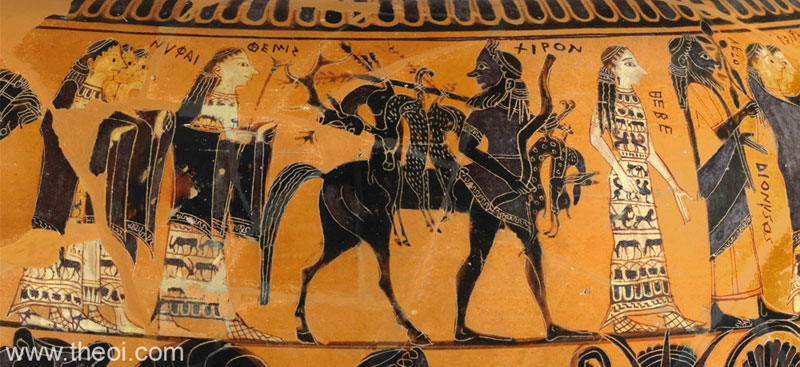
CHIRON & THE MARRIAGE OF PELEUS AND THETIS
Homer, Iliad 19. 390 ff (trans. Lattimore) (Greek epic C8th B.C.) :
"He [Akhilleus (Achilles)] pulled out from its standing place the spear of his father [Peleus], huge,
heavy, thick, which no one else of all the Akhaians (Achaeans) could handle, but Akhilleus alone knew how to
wield it, the Pelian ash spear which Kheiron (Chiron) had brought to his father from high on Pelion, to be death
for fighters in battle."
Stasinus of Cyprus or Hegesias of Aegina, Cypria Fragment 5 (from Scholiast on the
Iliad 17. 140) (trans. Evelyn-White) (Greek epic C7th or C6th B.C.) :
"For at the marriage of Peleus and [the Nereid] Thetis, the gods gathered together on [Mount] Pelion to
feast and brought Peleus gifts. Kheiron (Chiron) gave him a stout ashen shaft which he had cut for a spear, and
Athena, it is said, polished it, and Hephaistos (Hephaestus) fitted it with a head."
Pindar, Nemean Ode 3. 52 ff (trans. Conway) (Greek lyric C5th B.C.) :
"This tale too of men of old have I . . . For Nereus' daughter [Thetis] glorious in her fruit, he [Kheiron
(Chiron)] set the marriage feast."
Pindar, Isthmian Ode 8. 38 ff (trans. Conway) (Greek lyric C5th B.C.) :
"[The goddess Themis addresses Zeus :] ‘Grant that her [the Nereid Thetis'] marriage be for an honour
given of heaven to Peleus, the son of Aiakos (Aeacus) . . . And to the immortal cave of Kheiron (Chiron) let
your bidding speedily take its way [i.e. let Kheiron instruct Peleus in the capture of Thetis].’"
Alcaeus, Fragment 42 (trans. Campbell, Vol. Greek Lyric I) (Greek lyric C6th B.C.)
:
"[Thetis] whom the noble son [Peleus] of Aiakos (Aeacus), inviting all the blessed gods to the wedding,
married, taking her from the halls of Nereus to the home of Kherronos [Kheiron (Chiron)]."
Pseudo-Apollodorus, Bibliotheca 3. 170 (trans. Aldrich) (Greek mythographer C2nd
A.D.) :
"Zeus wanted to marry her [the Nereid Thetis] off to a mortal. Kheiron (Chiron) warned Peleus to grab
Thetis and hold on while she changed her form . . . They were married on [Mount] Pelion, and the gods celebrated
the marriage with hymns and a banquet. Kherion gave Peleus a spear of ash-wood."
Quintus Smyrnaeus, Fall of Troy 1. 592 ff (trans. Way) (Greek epic C4th A.D.)
:
"He [Akhilleus (Achilles)] swung up in his mighty hand and sped the long spear warrior-slaying, wrought by
Kheiron (Chiron)."
Valerius Flaccus, Argonautica 1. 130 ff (trans. Mozley) (Roman epic C1st A.D.)
:
"Argos adds paintings [to the hull of the ship Argo] of varied grace . . . Opposite to this is a fire and a
bed of green leaves, a banquet and wines, and in the midst of the Sea-Gods the son of Aeacus [Peleus] with his
wife [Thetis]; they have drunk, and now Chiron [Kheiron] is touching the lyre."
Statius, Achilleid 1. 105 ff (trans. Mozley) (Roman epic C1st A.D.) :
"His [Kheiron's (Chiron's)] lofty home bores deep into the mountain, beneath the long, overarching vault of
Pelion; part had been hollowed out by toil, part worn away by its own age. Yet the images and couches of the
gods are shown, and the places that each had sanctified by his reclining and his sacred presence [at the
marriage-feast of Peleus and Thetis]."
Statius, Silvae 1. 2. 215 ff (trans. Mozley) (Roman poetry C1st A.D.) :
"Peleus [was led] to Thessalian Tempe, when Chiron high on his horse's body looked forth and beheld Thetis
draw nigh to the Haemonian strand [and advised him how to capture her as his bride]."
Colluthus, Rape of Helen 29 ff (trans. Mair) (Greek poetry C5th to C6th A.D.)
:
"[The gods attend the wedding of Peleus and Thetis :] Coming to the groves of the Kentauros (Centaur) . . .
But Eris (Strife) did Kheiron (Chiron) leave unhonoured : Kheiron did not regard her and Peleus heeded her
not."
CHIRON MENTOR OF ACHILLES
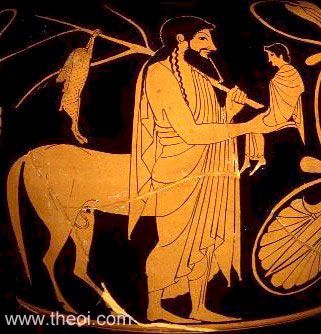
Homer, Iliad 11. 832 ff (trans. Lattimore) (Greek epic C8th B.C.) :
"[Eurypylos addresses Patroklos (Patroclus) during the Trojan War :] ‘Cut the arrow out of my thigh .
. . and put kind medicines on it, good ones, which they say you have been told of by Akhilleus (Achilles), since
Kheiron (Chiron), most righteous of the Kentauroi (Centaurs), told him about them.'"
Hesiod, Catalogues of Women Fragment 68 (trans. Evelyn-White) (Greek epic C8th or
C7th B.C.) :
"Kheiron (Chiron) was tending the son of Peleus, swift-footed Akhilleus (Achilles), pre-eminent among men,
on woody Pelion; for he was still a boy."
Pindar, Pythian Ode 6. 19 ff (trans. Conway) (Greek lyric C5th B.C.) :
"On your right hand you set him, and thus fulfil the charge, given of old they say, by Kheiron (Chiron) on
his hill to Akhilleus (Achilles), far from home, the strong-armed son of Peleus :--‘To Kronos' son [Zeus],
first of all gods, I bid you to deep-voiced Zeus, lord of the lightnings and the thunder, your worship in full
measure pay; then to your parents while their life shall last, like honour never fail to render.’"
Pindar, Nemean Ode 3. 43 ff :
"Fair-haired Akhilleus (Achilles) dwelling in Philyra's halls, while yet a child made mighty deeds his
play; many a time his hand brandished the sort tipped javelin, like to the wind in speed, and with wild lions he
fought, and dealt them death. Boars too he slew, shoe panting frames, the first in his sixth year and then
through all his days--he brought to the Kentauros (Centaur), Kronos' (Cronus') son . . . This tale too of men of
old have I. Wise-hearted Kheiron (Chiron) nursed the great Iason (Jason) under his roof, and to Asklepios
(Asclepius) taught the soft-fingered skills of medicine's lore. For Nereus' daughter [Thetis] glorious in her
fruit, he set the marriage feast, and reared her peerless son, and taught him all the crafts of battle, stirring
his eager soul to high endeavour."
Bacchylides, Fragment 27 (trans. Campbell, Vol. Greek Lyric IV) (Greek lyric C5th
B.C.) :
"The wise son of Philyra [Kheiron (Chiron)] often says of him, touching his [Akhilleus (Achilles)] blond
head: he declares that he will crimson the eddying Skamandros as he kills the battle-loving Trojans . . . and
will lie [be burried] in a foreign land."
Pseudo-Apollodorus, Bibliotheca 3. 172 (trans. Aldrich) (Greek mythographer C2nd
A.D.) :
"[The Nereid Thetis] deserted her infant son [Akhilleus (Achilles)] and went off to join the Nereides.
Peleus took the boy to Kheiron (Chiron), who accepted him and nourished him on the entrails of lions and wild
boars and on the marrow of bears. He named him Akhilleus--his original name was Ligyron)--because he had not
touched breasts with his lips."
Apollonius Rhodius, Argonautica 1. 551 ff (trans. Rieu) (Greek epic C3rd B.C.)
:
"Kheiron (Chiron) son of Philyra came down from the high ground [of Mount Pelion] to the sea and wading out
into the grey surf waved his great hand again and again and wished the travellers [the Argonauts sailing off in
their ship] a happy home-coming. His wife came too. She was carrying Peleus' little boy Akhilleus (Achilles) on
her arm, and she held him up for his dear father to see."
Apollonius Rhodius, Argonautica 4. 812 ff :
"[Hera addresses Thetis :] ‘Your son Akhilleus (Achilles), who is now with Kheiron the Kentauros
(Centaur Chiron) and is fed by Water-Nymphai (Nymphs) though he should be at your breast.’"
Plato, Hippias Minor 371d (trans. Fowler) (Greek philosopher C4th B.C.) :
"[Akhilleus (Achilles)] the son of Thetis, pupil of the most wise Kheiron (Chiron)."
Plato, Republic 391c (trans. Shorey) :
"Akhilleus (Achilles), the son of a goddess and of Peleus the most chaste of men, grandson of Zeus, and
himself bred under the care of the most sage Kheiron (Chiron)."
Pausanias, Description of Greece 3. 18. 10 - 16 (trans. Jones) (Greek travelogue C2nd
A.D.) :
"[Amongst the scenes illustrated on the throne of Apollon at Amyklai (Amyclae) near Sparta :] There is also
Peleus handing over Akhilleus (Achilles) to be reared by Kheiron (Chiron), who is also said to have been his
teacher."
Pausanias, Description of Greece 5. 19. 8 - 9 :
"[Amongst the scenes depicted on the chest of Kypselos (Cypselus) dedicated at Olympia :] There is a
Kentauros (Centaur) with only two of his legs those of a horse; his forelegs are human. Next come two-horse
chariots with women standing in them. The horses have golden wings, and a man is giving armour to one of the
women. I conjecture that this scene refers to the death of Patroklos (Patroclus); the women in the chariots, I
take it, are Nereides, and Thetis is receiving the armour from Hephaistos (Hephaestus). And moreover, he who is
giving the armour is not strong upon his feet, and a slave follows him behind, holding a pair of fire-tongs. An
account also is given of the Kentauros (Centaur), that he is Khiron (Chiron), freed by this time from human
affairs and held worthy to share the home of the gods, who has come to assuage the grief of Akhilleus (Achilles)
[perhaps in his constellation form]."
Aelian, On Animals 2. 18 (trans. Scholfield) (Greek natural history C2nd A.D.)
:
"In Homer skill in treating the wounded and persons in need of medicine goes back as far as the third
generation of pupil and master [see Iliad 11. 832 above]. Thus Patroklos (Patroclus), son of Menoitios,
is taught the healing art by Akhilleus (Achilles), and Akhilleus, son of Peleus, is taught by Kheiron (Chiron),
son of Kronos (Cronus)."
Aelian, Historical Miscellany 12. 25 (trans. Wilson) (Greek rhetorician C2nd to 3rd
A.D.) :
"[On wise counsellors :] Odysseus benefited from Alkinous (Alcinous), Akhilleus (Achilles) from Kheiron
(Chiron), Patroklos (Patroclus) from Akhilleus."
Philostratus the Elder, Imagines 2. 2 (trans. Fairbanks) (Greek rhetorician C3rd
A.D.) :
"[Ostensibly a description of an ancient Greek painting at Neapolis (Naples) :] The Education of Akhilleus
(Achilles). A fawn and a hare--these are the spoils of hunting of Akhilleus as he is now . . . the exploits here
depicted, done at Kheiron's (Chiron's) home, seem to deserve apples and honey as rewards, and you are content
with small gifts . . . This Akhilleus, a child not yet conscious of valour, whom Kheiron still nourishes upon
milk and marrow and honey, he has offered to the painter as a delicate, sport-loving child and already light of
foot.
Kheiron flatters him by saying that he catches hares like a lion and vies with fawns in running; at any rate, he
has just caught a fawn and comes to Kheiron to claim his reward, and Kheiron, delighting to be asked, stands
with fore-legs bent so as to be on a level with the boy and offers him apples fair and fragrant from the fold of
his garment--for their very fragrance seems to be depicted--and with his hand he offers him a honeycomb dripping
with honey, thanks to the diligent foraging of the bees. For when bees find good meadows and become big with
honey, the combs get filled to overflowing and their cells pour it forth. Now Kheiron is painted in every aspect
like a kentauros (centaur); yet to combine a horse and human body is no wondrous deed, but to gloss over the
juncture and make the two into one whole and, by Zeus, cause on to end and the other to begin in such wise as to
elude the eye of the observer who should try to detect where the human body ends, this seems to me to demand an
excellent painter. That the expression seen in the eye of Kheiron is gentle is the result of his justice, but
the lyre also does its part, through whose music he has become cultured; but now there is also something of
cozening in his look, no doubt because Kheiron knows that this soothes children and nurtures them better than
milk.
This is the scene at the entrance of the cave; and the boy out on the plain, the one who is sporting on the back
of the kentauros (centaur) as if it were a horse, is still the same boy; for Kheiron is teaching Akhilleus to
ride horseback and to use him exactly as a horse, and he measures his gait to what the boy can endure, and
turning around he smiles at the boy when he laughs aloud with enjoyment, and all but says to him, ‘Lo, my
hoofs paw the ground for you without use of spur; lo, I even urge you on; the horse is indeed a spirited animal
and gives no ground for laughter. For although you have been taught by me thus gently the art of horsemanship,
divine boy, and are suited to such a horse as I, some day you shall ride on Xanthos and Balios; and you shall
take many cities and slay many men, you merely running and they trying to escape you.’
Such is Kheiron's prophecy for the boy, a prophecy fair and auspicious and quite unlike that of Xanthos."
[N.B. in the Iliad the horse Xanthos foretells Akhilleus' death.]
Ptolemy Hephaestion, New History Book 6 (summary from Photius, Myriobiblon 190)
(trans. Pearse) (Greek mythographer C1st to C2nd A.D.) :
"The master of Kheiron (Chiron) was called Akhilleus (Achilles) and it of him that the name came which
Kheiron gave to the son of Peleus."
Ptolemy Hephaestion, New History Book 6 (summary from Photius, Myriobiblon 190)
:
"Thetis burned in a secret place the children she had by Peleus; six were born; when she had Akhilleus
(Achilles), Peleus noticed and tore him from the flames with only a burnt foot and confided him to Kheiron
(Chiron). The latter exhumed the body of the Gigante (Giant) Damysos who was buried at Pallene--Damysos was the
fastest of all the Gigantes (Giants)--removed the astragale and incorporated it into Akhilleus' foot
using ‘ingredients’. This astragale fell when Akhilleus was pursued by Apollon and it was
thus that Akhilleus, fallen, was killed."
Pseudo-Hyginus, Astronomica 2. 38 (trans. Grant) (Roman mythographer C2nd A.D.)
:
"Chiron, son of Saturnus [Kronos (Cronus)] and Philyra, who surpassed not only the other Centauri, but also
men in justice, and is thought to have reared Aesculapius and Achilles."
Ovid, Fasti 5. 379 ff (trans.Boyle) (Roman poetry C1st B.C. to C1st A.D.)
:
"There's cave of ancient rock [of Mount Pelion], where, they record, the good old man [Kheiron (Chiron)]
resided. He is believed to have detained in lyric song the hands [Achilles] destined to send Hector to death.
Alcides [Heracles] arrived with his labours partly complete . . . Achilles' hands could not resist the brazen
impulse to touch the shaggy skin [of Herakles' cape] and its bristles. While the old man [Chiron] fingers the
foul, poisoned shafts, an arrow slips out and stabs his left foot . . . The blood of Lerna's Hydra and he
Centaur's blood mingled, and gave no time for rescue. Achilles stood tar-soaked, as if before his sire: the
dying Peleus would be mourned like this. His loving hands often stroked Chiron's frail hands (rewarding the
teacher with values learnt). He kissed him often, and said to him where he lay : ‘Live, I beg you; don't
leave me, dear father!’ The ninth day arrived, when you, righteous Chiron [died and was placed amongst the
stars]."
Seneca, Troades 830 ff (trans. Miller) (Roman tragedy C1st A.D.) :
"Here, reclining at full length within his hollowed mountain cave, Chiron, tutor of a youth [Akhilleus
(Achilles)] already pitiless, with his quill striking out tinkling chords, even then whetted the boy's mighty
passions by songs of war."
Valerius Flaccus, Argonautica 1. 255 ff (trans. Mozley) (Roman epic C1st A.D.)
:
"And now [when the Argonauts prepared to begin their voyage] speeding down from the mountain-tops came
Chiron, holding up to view Achilles who called to his sire from afar. As soon as the child saw Peleus start at
the well-known voice and stretch out his arms in wide embrace, he sprang forward and hung long on his dear neck
. . . Peleus in joy clasps his son and kisses him eagerly, and looking up to the heavens he cries : ‘. . .
Ye gods, do ye preserve his [Achilles'] life. All else do thou, Chiron, vouchsafe. Let my little son marvel to
hear thee speak of clarions and of wars; do thou teach him to wield his boyish weapons in the chase, and ere
long to grasp my spear.’"
Valerius Flaccus, Argonautica 1. 406 ff :
"Also Actor's son [Menoitios (Menoetius) upon departing with the Argonauts] leaves his child [Patroklos
(Patroclus)] in Chiron's cave, side by side with his dear Achilles, to study the chords of the harp, and side by
side to hurl a boy's light javelins, and to learns to mount and ride upon the back of the genial master."
Statius, Achilleid 1. 105 ff (trans. Mozley) (Roman epic C1st A.D.) :
"[Thetis witnesses the arrival of Paris and Helene at Troy :] She wearies her mind with schemes essayed,
and taught cunning by her devoted love seeks out the aged Chiron. His lofty home bores deep into the mountain,
beneath the long, overarching vault of Pelion; part had been hollowed out by toil, part worn away by its own
age. Yet the images and couches of the gods are shown, and the places that each had sanctified by his reclining
and his sacred presence [at the marriage-feast of Peleus and Thetis]; within are the Centaurus' (Centaur's) wide
and lofty stalls, far different from those of his wicked brethren. Here are no spears that have tasted human
blood, nor ashen clubs broken in festal conflict, nor mixing-bowls shattered upon kindred foemen, but innocent
quivers and mighty hides of beasts. These did he take while yet in the prime of age; but now, a warrior no more,
his only toil was to learn the herbs that bring health to creatures doubting of their lives, or to describe to
his pupil upon his lyre the heroes of old time.
On the threshold's edge he awaited his return from hunting, and was urging the laying of the feast and
brightening his abode with lavish fire: when far off the Nereis was seen climbing upward from the shore; he
burst forth from the forests--joy speeds his going--and the well-known hoof-beat of the sage rang on the now
unwonted plain. Then bowing down his horse's shoulders he leads her with courtly hand within his humble dwelling
and warns her of the cave.
Long time has Thetis been scanning every corner with silent gaze : then, impatient of delay, she cries :
‘Tell me, Chiron, where is my darling? Why spends the boy any time apart from thee? Is it not with reason
that my sleep is troubled, and terrible portents from the gods and fearful panics--would they were
false!--afflict his mother's heart? For now I behold swords that threaten to pierce my womb, now my arms are
bruised with lamentation, now savage beasts assail my breasts [i.e. prophecy of the death of her son at Troy] .
. . but 'tis long to recount all, and I am forbidden; give him to me rather.’
Thus spoke his mother in lying speech--nor would he have given him up, had she dared to confess to the old man
the soft raiment and dishonourable garb [i.e. Thetis' plain to disguise her son as a girl]. Then he replies :
‘Take him, I pray, O best of parents, take him, and assuage the gods with humble entreaty. For thy hopes
are pitched too high, and envy needs much appeasing. I add not to thy fears, but will confess the truth: some
swift and violent deed--the forebodings of a sire deceive me not--is preparing, far beyond his tender years.
Formerly he was wont to endure my anger, and listen eagerly to my commands nor wander far from my cave: now Ossa
cannot contain him, nor mighty Pelion and all the snows of Thessalia (Thessaly). Even the Centauri (Centaurs)
often complain to me of plundered homes and herds stolen before their eyes, and that they themselves are driven
from field and river; they devise violence and fraud, and utter angry threats. Once when the Thessalian pine
bore hither the princes of Argo, I saw the young Alcides [Heracles] and Theseus--but I say no more.’
Cold pallor seized the daughter of Nereus: lo! he [Achilles] has come . . . He has stricken a lioness lately
delivered and had left her in the empty lair, but had brought her cubs and was making them show their claws. Yet
when he sees his mother on the well-known threshold, away he throws them, catches her up and binds her in his
longing arms, already violent in his embrace and equal to her in height. Patroclus follows him, bound to him
even then by a strong affection . . .
Straightway with rapid bound he hies him to the nearest river, and freshens in its waters his steaming face and
hair . . . The old man [Chiron] marvels as he adorns him, caressing how his breast, and now his strong
shoulders: her very joy pierces his mother's heart. Then Chiron prays her to taste the banquet and the gifts of
Bacchus [Dionysos], and contriving various amusements for her beguiling at last brings forth the lyre and moves
the care-consoling strings, and trying the chords lightly with his finger gives them to the boy. Gladly he sings
of the mighty causes of noble deeds . . . lastly [he sung] of his mother's marriage-feast and Pelion trodden by
the gods. Then Thetis relaxed her anxious countenance and smiled. Night draws them on to slumber: the huge
Centaurus lays him down on a stony couch, and Achilles lovingly twines his arms about his shoulders--though his
faithful parent is there--and prefers the wonted breast.
But Thetis, standing by night upon the sea-echoing rocks, this way and that divides her purpose, and ponders in
what hiding-place she will set her son, in what country she shall choose to conceal him . . . Then in her own
arms she carries Achilles [to the island of Skyros], his body utterly relaxed in the boy's slumber, from the
rocks of the Haemonian cave down to the placid waters and the beach . . . Chiron escorts the goddess, and
careless of the sea entreats her speedy return, and hides his moistened eyes and high upon his horse's body
gazes out towards them as suddenly they are whirled away, and now--and now are lost to view, where for a short
while the foamy marks of their going gleam white and the wake dies away into the watery main. Him destined never
more to return to Thessalian Tempe now mournful Pholoe bewails, now cloudy Othrys, and Spercheos with diminished
flood and the silent grotto of the sage."
Statius, Achilleid 1. 478 ff :
"Whom else [but Akhilleus (Achilles)] did the Centaurus [Kheiron (Chiron)] take in hand and shape his rude
beginnings and tender years?"
Statius, Achilleid 2. 96 ff :
"[The young Akhilleus (Achilles) addresses Odysseus after his discovery on the island of Skyros (Scyrus) :]
Even in my years of crawling infancy, when the Thessalian sage [Kheiron (Chiron)] received me on his stark
mountain-side, I am said to have devoured no wonted food, nor to have sated my hunger at the nourishing breast,
but to have gnawed the tough entrails of lions and the bowels of a half-slain she-wolf. That was my first bread,
that the bounty of joyous Bacchus [Dionysos, i.e. wine], in such wise did that father of mine [Kheiron (Chiron)]
feed me. Then he taught me to go with him through pathless deserts, dragging me on with mighty stride, and to
laugh at sight of the wild beasts, nor tremble at the shattering of rocks by rushing torrents or at the silence
of the lonely forest. Already at that time weapons were in my hand and quivers on my shoulders, the love of
steel grew apace within me, and my skin was hardened by much sun and frost; nor were my limbs weakened by soft
couches, but I shared the hard rock with my master's mighty frame.
Scarce had my youth turned the wheel of twice six years, when already he made me outpace the swift hinds and
Lapith steeds and running overtake the flung dart; often Chiron himself, while yet he was swift of foot, chased
me at full gallop with headlong speed o'er the plains, and when I was exhausted by roaming over the meads he
praised me joyously and hoisted me upon his back. Often too in the first freezing of the streams he would bid me
go upon them with light step nor break the ice. These were my boyhood's glories . . .
Never would he suffer me to follow unwarlike does through the pathless glens of Ossa, or lay low timid lynxes
with my spear, but only to drive angry bears from their resting-places, and boars with lightning thrust; or if
anywhere a mighty tiger lurked or a lioness with her cubs in some secret lair upon the mountain-side, he
himself, seated in his vast cave, awaited my exploits, if perchance I should return bespattered with dark blood;
nor did he admit me to his embrace before he had scanned my weapons. And already I was being prepared for the
armed tumults of neighbouring folk, and no fashion of savage warfare passed me by . . .
Scarce could I recount all my doings, successful though they were; now he instructs me to climb and grasp the
airy mountain-peak, with what stride to run upon the level, how to catch flung stones in mimic battle on my
shielded arm, to pass through burning houses, and to check flying four-horse teams on foot. Spercheus, I
remember, was flowing with rapid current, fed full with constant rains and melted snows and carrying on its
flood boulders and living trees, when the sent me in, there where the waves rolled fiercest, and bade me stand
against them and hurl back the swelling billows that he himself could scarce have borne, though he stood to face
them with so many a limb. I stove to stand, but the violence of the stream and the dizzy panic of the broad
spate forced me to give ground; he loomed o'er me from above and fiercely threatened, and flung taunts to shame
me. Nor did I depart till he gave me word, so far did the lofty love of fame constrain me, and my toils were not
too hard with such a witness.
For to fling the Oebalian quoit far out of sight into the clouds, or to practise the holds of the
sleek-wrestling bout, and to scatter blows with the boxing-gloves were sport and rest to me: nor laboured I more
therein that when I struck with my quill the sounding strings, or told the wondrous fame of heroes of old. Also
did he teach me of juices and the grasses that succour disease, what remedy will staunch to fast a flow of
blood, what will lull to sleep, what will close gaping wounds; what plague should be checked with a knife, what
will yield to herbs; and he implanted deep within my heart the precepts of divine justice, whereby he was wont
to give revered laws to the tribes that dwell on Pelion, and tame his own twy-formed folk [the Kentauroi
(Centaurs)]. So much do I remember, friends, of the training of my earliest years, and sweet is their
remembrance."
Statius, Silvae 2. 1. 88 (trans. Mozley) (Roman poetry C1st A.D.) :
"Often do alien or adopted children creep further into our hearts that our own kindred . . . Thus by his
winning ways the half-beast Chiron supplanted Haemonian Peleus in young Achilles' favour."
CHIRON MENTOR OF OTHER GODS & HEROES
Ptolemy Hephaestion, New History Book 4 (summary from Photius, Myriobiblon 190)
(trans. Pearse) (Greek mythographer C1st to C2nd A.D.) :
"Dionysos was loved by Kheiron (Chiron), from whom he learned chants and dances, the bacchic rites and
initiations."
Ptolemy Hephaestion, New History Book 1 (summary from Photius, Myriobiblon 190)
:
"He [Ptolemy Hephaestion] then pretends that the sense of the passage discussed by Euphorion [Greek
grammarian C3rd B.C.] in his Hyakinthia, ‘Only Kokytos (Cocytus) washed the wounds of Adonis',
was as follows : Kokytos was the name of a pupil to whom Kheiron (Chiron) had taught medicine and who cared for
Adonis when he was wounded by the wild boar.’"
CHIRON & HIS DAUGHTER MELANIPPE
Pseudo-Hyginus, Astronomica 2. 18 (trans. Grant) (Roman mythographer C2nd A.D.)
:
"Euripides [playwright C5th B.C.] in his Melanippe, says that Melanippe, daughter of Chiron the
Centaurus (Centaur), was once called Thetis. Brought up on Mount Helicon, a girl especially fond of hunting, she
was wooed by Aeolus, son of Hellen, and grandson of Jove [Zeus], and conceived a child be him. When her time
drew near, she fled into the forest, so that her father, who supposed her a virgin, might not see that she had
given birth to a grandchild. And so when her father was looking for her, she is said to have begged the power of
the gods not to let her father see her in childbirth. After the child was born, by the will of the gods she was
changed into a mare which was placed among the stars.
Some say that she was a prophetess, and because she used to reveal the plans of the gods to men, she was changed
into a mare.
Callimachus [poet C3rd B.C.] says that because she ceased hunting and worshipping Diana [Artemis], Diana changed
her into the shape we have mentioned. For the reason above, too, she is said to be out of sight of the
Centaurus, sho come say is Chiron, and to show only half her body, since she didn't want her sex to be
known."
Ovid, Metamorphoses 2. 636 ff (trans. Melville) (Roman epic C1st B.C. to C1st A.D.)
:
"One day the Centaurus' [Kheiron's (Chiron's)] daughter came, her auburn hair falling upon her shoulders,
whom the Nympha Chariclo once had borne upon the bank beside a flowing river, and had named Ocyroe
(Swift-Flowing). The girl was not content to know her father's art: she prophesied fate's dark secrets. In the
mystic mood of prophecy, when hidden in her heart the heavenly fervour glowed, she fixed her eyes upon the child
[Asklepios (Asclepius), then in the care of Kheiron]. ‘Grow strong, dear boy,' she said [and prophesises
his future] . . . You too, dear father [Kheiron], you, immortal now and destined by your birthright to live on
through all eternity, will long to die when you are tortured by the serpent's blood [poisoned by an arrow coated
with Hydra's blood], that agonizing poison in your wounds; and, saved from immortality, the gods shall put you
in death's power, and the three Goddesses (Deae Triplices) [Moirai, Fates] shall unloose your threads
of fate.’
More prophecies remained, but then she sighed, sighed deeply, and as tears rolled down her cheeks she cried,
‘Fate forestalls me! I'm forbidden to tell you more. My power of speech is stopped. My arts--oh! never
worth so much!--have brought Heaven's wrath upon me.’
[And she was transformed into a mare by the gods.] . . . Philyreius [Kheiron (Chiron)], the centaur half-divine,
invoked, weeping, the lord of Delphi [Apollon], but in vain. Apollo had no power to countermand great Jove's
[Zeus'] decrees and, had he had the power, he was not there.”
THE DEATH OF CHIRON & THE CONSTELLATION SAGITTARIUS
Pseudo-Apollodorus, Bibliotheca 2. 83 - 87 (trans. Aldrich) (Greek mythographer C2nd
A.D.) :
"Herakles (Heracles) turned back [the Kentauroi (Centaurs) of Mount Pholoe] with a volley of fire-brands;
he sent arrows after the others and chased them as far as Malea. There they took refuge with Kheiron (Chiron),
who, after the Lapithai (Lapiths) had driven him from Mount Pelion, settled on Malea. Herakles let loose an
arrow at the kentaroi as they huddled round Kheiron, which penetrated the arm of Elatos and landed in Kheiron's
knee. In horror Herakles ran to him, pulled out the arrow and dressed the wound with a salve that Kheiron handed
him. The festering wound was incurable, however, and Kheiron moved into his cave, where he yearned for death,
but could not die because he was immortal. Prometheus thereupon proposed Herakles to Zeus, to become immortal in
place of Kheiron: and so Kheiron died."
Pseudo-Apollodorus, Bibliotheca 1. 119 :
"[Herakles] released Prometheus; and he offered Zeus Kheiron (Chiron), who was willing to die in Herakles'
place."
Diodorus Siculus, Library of History 4. 12. 8 (trans. Oldfather) (Greek historian
C1st B.C.) :
"[As Herakles was slaying the Kentauroi (Centaurs) of Mount Pholoe with his arrows :] Herakles unwittingly
by a shot from his bow killed the Kentauroi Kheiron (Centaur Chiron), who was admired for his knowledge of
healing."
Pausanias, Description of Greece 5. 5. 9 - 10 (trans. Jones) (Greek travelogue C2nd
A.D.) :
"The Anigros [river of Elis] descends from the mountain Lapithos in Arkadia (Arcadia), and right from its
source its water does not smell sweet but actually stinks horribly . . . Some Greeks say that Khiron (Chiron),
other that Pylenor another Kentauros (Centaur), when shot by Herakles fled wounded to this river and washed his
hurt in it, and that it was the Hydra's poison which gave the Anigros its nasty smell."
Pseudo-Hyginus, Astronomica 2. 38 (trans. Grant) (Roman mythographer C2nd A.D.)
:
"[Consellation] Centaurus. He is said to be Chiron, son of Saturnus [Kronos (Cronus)] and Philyra, who
surpassed not only the other Centauri, but also men in justice, and is thought to have reared Aesculapius and
Achilles. By his conscientiousness and diligence, therefore, he won inclusion among the stars.
When Hercules [Heracles] was once visiting Chiron, and while sitting with him was examining his arrows, one of
them is said to have fallen on the foot of Chiron, and thus brought about his death. Others say that when the
Centaurus wondered at his being able to kill such huge creatures as Centauri (Centaurs) with such slight arrows,
he himself tried to draw the bow, and the arrow, slipping from his hand, fell on his foot. [N.B. This myth is
usually told of the centaur Pholos.]
For this reason Jupiter [Zeus], pitying him, put him among the constellations with a victim which he seems to
hold above the altar for sacrifice. Others have sais that he is Pholus the Centaurus (Centaur), who was more
skilled in augury that the rest. Consequently, by the will of Jove [Zeus], he was represented coming to the
altar with a victim."
Ovid, Metamorphoses 2. 649 ff (trans. Melville) (Roman epic C1st B.C. to C1st A.D.)
:
"[Kheiron (Chiron)], you, immortal now and destined by your birthright to live on through all eternity,
will long to die when you are tortured by the serpent's blood [i.e. poisoned by an arrow coated with Hydra's
blood], that agonizing poison in your wounds; and, saved from immortality, the gods shall put you in death's
power, and the three Goddesses [Moirai, Fates] shall unloose your threads of fate."
Ovid, Fasti 5. 379 ff (trans.Boyle) (Roman poetry C1st B.C. to C1st A.D.)
:
"Chiron displays his stars, that hybrid man mixed with a tawny horse. Mount Pelion of Haemonia faces south;
the summit greens with pines, the rest with oak. Philyra's son claimed it. There's cave of ancient rock, where,
they record, the good old man resided. He is believed to have detained in lyric song the hands [Akhilleus
(Achilles)] destined to send Hector to death. Alcides [Heracles] arrived with his labours partly complete;
little but the final tasks remained. You would have seen by chance the two death-fates of Troy, the Aecides boy
[Achilles] and Jupiter's son [Heracles]. Philyra's hero welcomes the young man warmly, and asks the cause of his
coming. He's told. He gazes at the club and lion spoils, and says : ‘The man deserves the arms, the arms
the man.’
Achilles' hands could not resist the brazen impulse to touch the shaggy skin and its bristles. While the old man
fingers the foul, poisoned shafts, an arrow slips out and stabs his left foot. Chiron groaned and hauled the
iron from his flesh; Alcides [Heracles] groans and Haemonia's boy. Chiron blends picked herbs from the Pagasean
hills, and soothes the wound with different treatments. The corrupting poison swamped the treatments; disease
penetrated bones and body. The blood of Lerna's Hydra and he Centaur's blood mingled, and gave no time for
rescue. Achilles stood tar-soaked, as if before his sire: the dying Peleus would be mourned like this. His
loving hands often stroked Chiron's frail hands (rewarding the teacher with values learnt). He kissed him often,
and said to him where he lay : ‘Live, I beg you; don't leave me, dear father!’
The ninth day arrived, when you, righteous Chiron, encircled yourself with twice seven stars [i.e. took on the
form of the constellation Centaurus or Saggitarius]."
CHIRON POETIC MISCELLANY
Homer's Epigrams 14 (trans. Evelyn-White) (Greek epic C8th or C7th B.C.) :
"[A curse :] Let Kheiron (Chiron) also come and bring many Kentauroi (Centaurs) [i.e. to cause harm]."
Seneca, Hercules Furens 970 ff (trans. Miller) (Roman tragedy C1st A.D.) :
"[The Aloadai giants pile three Thessalian mountains, home of the Kentauroi (Centaurs), upon the other to
reach heaven :] I'll snatch up ridges full of Centauri (Centaurs). Now with twin mountains I'll construct a
pathway to the realms above; Chiron shall see his own Pelion 'neath Ossa, and Olympus."
Nonnus, Dionysiaca 48. 77 ff (trans. Rouse) (Greek epic C5th A.D.) :
"[During the War of the Giants :] [The Giant] Peloreus took up [Mount] Pelion with hightowering peak as a
missile in his innumberable arms, and left the cave Philyre bare: as the rocky roof of his cave was pulled off,
old Kheiron (Chiron) quivered and shook, that figure of half a man growing into a comrade horse."
Nonnus, Dionysiaca 14. 49 ff :
"[Rheia summoned rustic gods to join the army of Dionysos in his war against the Indians :] After them came
also the gentle tribe of twiform Kentauroi (Centaurs). Beside Pholos in horse's form was Kheiron (Chiron),
himself of that strange nature, untamed, with mouth unbridled."
ANCIENT GREEK & ROMAN ART
SOURCES
GREEK
- Homer, The Iliad - Greek Epic C8th B.C.
- Hesiod, Catalogues of Women Fragments - Greek Epic C8th - 7th B.C.
- The Homeric Hymns - Greek Epic C8th - 4th B.C.
- Epic Cycle, Titanomachia Fragments - Greek Epic C8th B.C.
- Epic Cycle, The Cypria Fragments - Greek Epic C7th - 6th B.C.
- Pindar, Odes - Greek Lyric C5th B.C.
- Greek Lyric I Alcaeus, Fragments - Greek Lyric C6th B.C.
- Greek Lyric IV Bacchylides, Fragments - Greek Lyric C5th B.C.
- Euripides, Fragments - Greek Tragedy C5th B.C.
- Plato, Hippias Minor - Greek Philosophy C4th B.C.
- Plato, Republic - Greek Philosophy C4th B.C.
- Apollodorus, The Library - Greek Mythography C2nd A.D.
- Apollonius Rhodius, The Argonautica - Greek Epic C3rd B.C.
- Callimachus, Hymns - Greek Poetry C3rd B.C.
- Lycophron, Alexandra - Greek Poetry C3rd B.C.
- Diodorus Siculus, The Library of History - Greek History C1st B.C.
- Pausanias, Description of Greece - Greek Travelogue C2nd A.D.
- Antoninus Liberalis, Metamorphoses - Greek Mythography C2nd A.D.
- Aelian, On Animals - Greek Natural History C2nd - 3rd A.D.
- Aelian, Historical Miscellany - Greek Rhetoric C2nd - 3rd A.D.
- Philostratus the Elder, Imagines - Greek Rhetoric C3rd A.D.
- Ptolemy Hephaestion, New History - Greek Mythography C1st - 2nd A.D.
- Quintus Smyrnaeus, Fall of Troy - Greek Epic C4th A.D.
- Nonnus, Dionysiaca - Greek Epic C5th A.D.
- Colluthus, The Rape of Helen - Greek Epic C5th - 6th A.D.
ROMAN
- Hyginus, Fabulae - Latin Mythography C2nd A.D.
- Hyginus, Astronomica - Latin Mythography C2nd A.D.
- Ovid, Metamorphoses - Latin Epic C1st B.C. - C1st A.D.
- Ovid, Fasti - Latin Poetry C1st B.C. - C1st A.D.
- Virgil, Georgics - Latin Bucolic C1st B.C.
- Propertius, Elegies - Latin Elegy C1st B.C.
- Pliny the Elder, Natural History - Latin Encyclopedia C1st A.D.
- Seneca, Hercules Furens - Latin Tragedy C1st A.D.
- Seneca, Troades - Latin Tragedy C1st A.D.
- Valerius Flaccus, The Argonautica - Latin Epic C1st A.D.
- Statius, Achilleid - Latin Epic C1st A.D.
- Statius, Silvae - Latin Poetry C1st A.D.
OTHER SOURCES
Other references not currently quoted here: Argonautica Orphica 452, Eustathius on Homer's Iliad 281, Scholiast on Pindar's Pythian 4.181.
BIBLIOGRAPHY
A complete bibliography of the translations quoted on this page.
